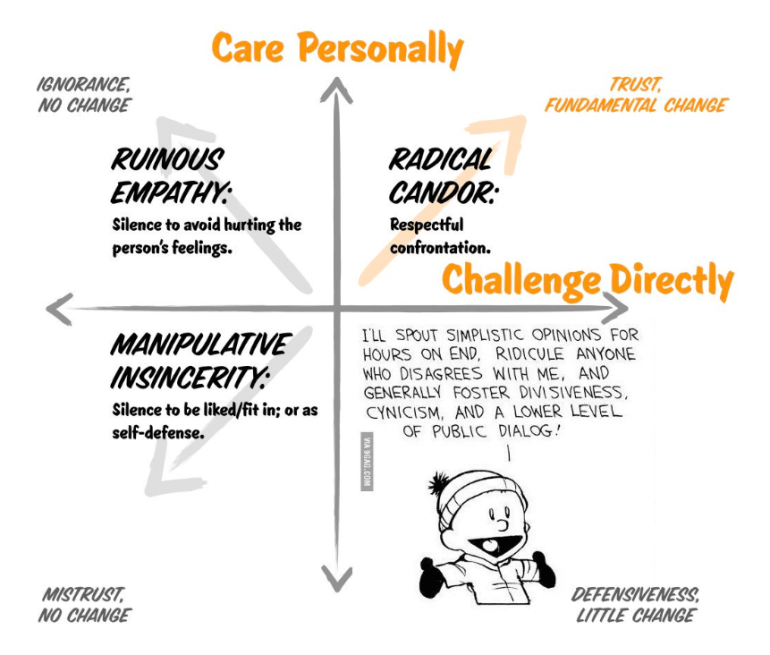Performance Evaluations
Performance evaluations are an important part of an employee’s career. These should happen 1-2 times a year and offer us a great oppurtunity to talk about ourselves from an employment and performance perspective. This is a great thing to do from time to time, and I highly suggest that the performance evaluation isn’t the only time to get into that frame of mind. You should be having regular check-ins with your direct reports to help support them, offer feedback, guidance, and magnify their strengths.
Radical Candor
Radical Candor is a fantastic book. Recommend for anyone who has to manage people, or just would like to learn how to give professional feedback. The audio book made the task of washing my cars fly by, it’s fantastic.

Yes, every single management book has a 4 quadrant graph. No need to be overly cynical about that, it’s just a way to simplify a decidedly complex social interaction - giving critical feedback.
Note: Radical Candor isn’t an excuse to be a d*ck. The whole “care personally” aspect must not be ignored.
- One of the most common mistakes is landing in the ruinous empathy quadrant.
- There is no substitute for in-person feedback
- Providing feedback via impromptu conversations avoids the artificial/disingenuous feeling of an arbitrarily scheduled 1:1
- Establish a culture of feedback first. Embrace and encourage feedback before giving it.
- Caring personally requires knowing people. Talk about where they came from, where they’re going, and how things are going here.
BB8 Worklog
BB8 has a built in worklog accumulator, every message you sent to #work-log in the specified year will be sent back to you in a single, massive list: bb worklog 2020. This is useful for reviewing everything you finished in the last year.
Tips for Managers
The forms and worksheets are just tools. Don’t get overly focus on them. Recognition, feedback, critical thought, and follow-through are the most important parts of the process.
Don’t stockpile feedback
Feedback is best delivered in context. Especially if it’s critical feedback. In the moment, or just after, take a moment to plot your feedback on the radical candor quadrant and carefully consider if the feedback is more suitable for a private conversation.
Note: Take care with immediate feedback to avoid “calling people out”. The goal is to provide respectful feedback.
Prepare an Outline of Topics
I usually create a bulleted list of items to talk about with each of my evals.
- Highlight notable achievements
- Review completed tasks
- Take note of learning and skill progress (soft and technical skills)
- Provide positive feedback for achievements, attitude, approach, and positive traits
- Provide clear and focused critical feedback for things to work on
Questions to get you started
Here’s a series of questions that are useful to get a performance evaluation started. Use these as icebreakers and let the conversation go where it leads. Use any you like, add your own, you do you.
- What’s your biggest achievement this period?
- What’s the most interesting thing you learned?
- Are you happy with the project you’re working on?
- Are you happy with the team you’re working with?
- Whats getting in your way that I can change?
- What programming skills do you want to improve? What habit changes could help to achieve this?
- What soft skills do you want to improve? What is one approach to at?
- What are your professional goals?
- Do you strive for advancement or are you comfortable with the way things are?
- Can I help by writing a referral or reaching out to any of my contacts?